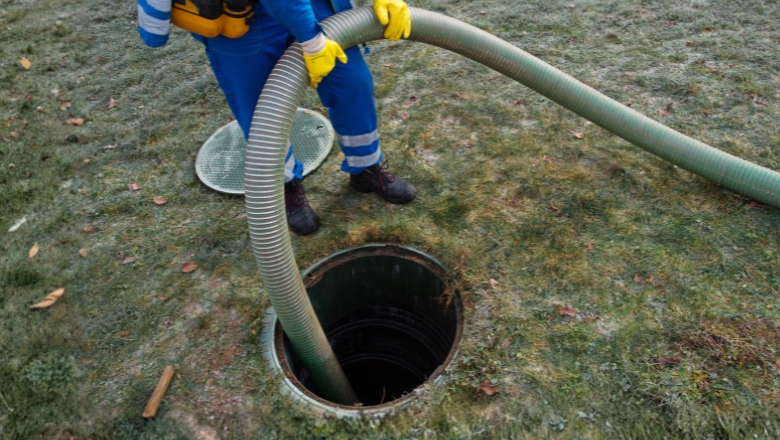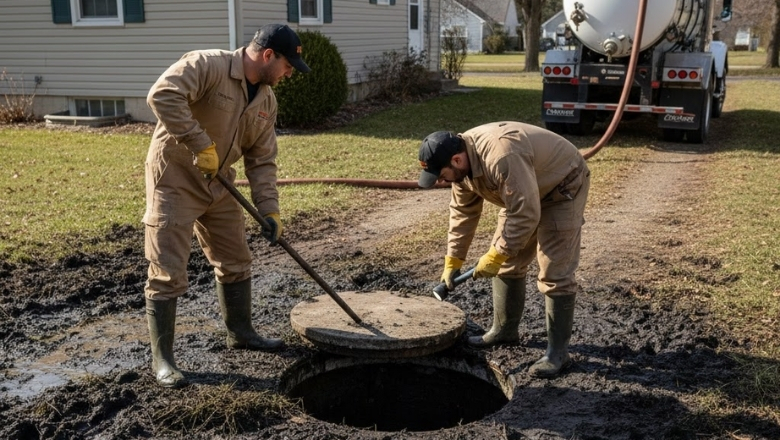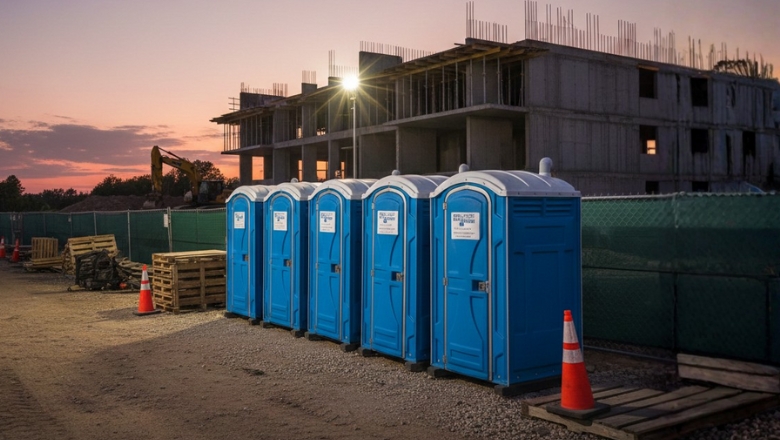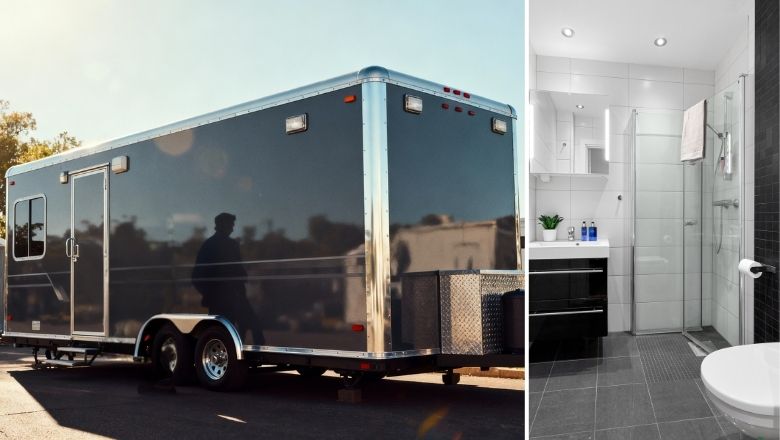Septic systems are important aspects of home and business and are usually considered as much. These systems control wastewater effluent and enable homes and property to run efficiently. However, certain conditions affect the operation and durability of septic systems, such as severe rainfall or drought, freezing, or very high temperatures. It is quite possible to experience variable weather conditions ranging from extremely hot summers and cold winters as complied in Idaho, and it is important to learn how this climate influences septic systems and what the residents of Rexburg, Idaho Falls, Pocatello, Twin Falls, and Rigby can do increase the lifespan of their septic systems.
This blog will discuss what extreme weather does to your septic system, how you can prevent damages, and why professional help such as MVP Rentals is vital when dealing with a septic system. Whenever you require septic service in Rexburg, septic service in Pocatello, or septic maintenance, you must learn the implications of severe climate change on your system.
The Relationship Between Weather and Septic Systems
Weather conditions impact practically all spheres of living regardless of septic systems. These systems depend on the surrounding soil and environment to be able to treat wastewater. When the weather changes, so does the performance of any septic system and how well it can operate. It is stated that weather conditions are appropriate for a system, from septic system installation to troubleshooting. Unfortunately, many people fail to heed this fact and end up having septic system-related issues that can be expensive to fix, sometimes costing one thousand dollars.
We will now describe how different kinds of weather influence septic systems and what measures homeowners and businesspeople can take.
Effects of Heavy Rainfall and Flooding
High-intensity precipitation and inundation are the main weather factors detrimental to the septic system. When the soil near a septic tank has been fully saturated with water, it cannot retain the wastewater being released from the septic tank. It can lead to wastewater infiltration to the home or, less desirably, resulting in polluting water sources close to the home. The risk is especially high for the properties in basements or climate zones with heavy rainfall during some time of the year.
Since spring and fall also have rainy seasons in Rexburg or Idaho Falls, it’s wise to check the septic system often to provide sufficient moisture handling. Hiring septic system professionals from different companies, such as MVP Rentals, can understand from the septic system owners to conduct periodic septic system inspections to check for any signs of faults that may require costly renovations later.
If your area floods frequently, it is high time you looked for a larger septic tank or an adjusted drain field. MVP Rentals provides several septic system options based on property requirements to protect the system from large volumes of water or flood damage.
Drought and Its Effects on Septic Systems
While most people worry about too much water, too little water can be just as damaging. Prolonged droughts can cause the soil around your septic system to dry out and compact, making it difficult for the soil to treat the wastewater from your home properly. In extreme cases, the lack of moisture can cause cracks in septic tanks and drain fields, leading to septic system failures.
During droughts, the best practice is to reduce water usage as much as possible to prevent system overload. If you notice signs of your septic tank failing during a drought, it’s essential to call in professionals for septic service. Whether in Pocatello, Rigby, or elsewhere in Idaho, MVP Rentals provides expert services, helping you maintain your system’s efficiency even during water-scarce periods.
Freezing Temperatures and Septic System Challenges
Idaho’s cold winters can pose severe challenges to septic systems, particularly in cities like Twin Falls and Rexburg, where temperatures can plummet. When temperatures drop below freezing, the water inside pipes and septic tanks can freeze, leading to blockages or cracks. If the tank freezes, it can become impossible for wastewater to flow out, leading to a complete system shutdown.
To avoid this, ensure your septic system is well insulated, and pipes are buried deep enough to avoid freezing. If you live in an area prone to freezing temperatures, consider upgrading your system to one more resistant to cold weather. Regular septic system maintenance is critical to identifying potential vulnerabilities before winter. With MVP Rentals offering septic service across Idaho, you can be assured that the system will be prepared for the harshest winter months.
Extreme Heat and Its Influence
Though freezing temperatures are a concern, extreme heat can also negatively affect septic systems. High temperatures can dry out the soil around the drain field, much like droughts, making it harder for the system to process and treat wastewater. Excessive heat can also encourage the growth of harmful bacteria in your septic tank, leading to potential health hazards if not managed properly.
If your property is located in a region of Idaho that experiences extreme summer temperatures, such as Twin Falls or Idaho Falls, it’s important to monitor your system during heatwaves. Routine septic system inspections and proper tank care can help mitigate the adverse impact of extreme heat. MVP Rentals provides specialized septic maintenance and troubleshooting services, ensuring your system remains operational, even during the hottest months.
Storm Surges and Septic System Vulnerabilities
Severe storms bring more than just heavy rains; storm surges can cause extensive flooding, which may overwhelm your septic system. These surges can introduce saltwater into your system, deleting pipes, tanks, and the bacteria needed to process wastewater. After a significant storm event, your septic system professional should inspect your system for saltwater damage or other issues that may have arisen from the storm.
Wildfires and Their Impact on Septic Systems
While wildfires may seem unrelated to septic systems, they can indirectly affect their operation. After a wildfire, the landscape changes dramatically. Soil erosion can expose parts of your system that should remain buried, and ash or debris can clog vents or access points, leading to potential malfunctions. Moreover, the heat from a nearby fire could damage plastic pipes or tanks, leading to the need for emergency repairs.
If you live in an area prone to wildfires, like Rexburg or Rigby, including your septic system in your emergency preparedness plan is a good idea. Regular septic system inspections and maintenance from MVP Rentals can help ensure your system is more resilient to wildfire-related issues.
The Importance of Regular Inspections and Maintenance
No matter where you live or what kind of extreme weather you face, one thing is certain: regular septic maintenance is essential for preventing unexpected failures. Routine inspections can identify problems before they become major, saving you time, money, and frustration.
With extreme weather becoming more unpredictable, ensuring your system is in peak condition is vital. MVP Rentals provides comprehensive septic service in cities like Rexburg, Pocatello, Rigby, Idaho Falls, and Twin Falls. Whether you need a basic inspection or a more detailed repair, MVP Rentals has the expertise to keep your system running smoothly year-round.
Long-Term Solutions to Weather-Proof Your Septic System
To protect your septic system from extreme weather, you may need to implement long-term solutions such as upgrading your system, installing backup pump generators, or increasing your system capacity. In areas where weather conditions are particularly severe, homeowners and businesses may also benefit from installing temporary waste solutions like portable restrooms during storms or natural disasters. MVP Rentals can provide these temporary waste solutions, ensuring your property remains functional even when your septic system is stressed.
Ensuring Septic System Resilience with MVP Rentals
Extreme weather is unpredictable, but your septic system doesn’t have to suffer. Understanding how different conditions—heavy rain, drought, freezing temperatures, or intense heat—impact your system is the first step in protecting it. Regular septic system inspections, careful septic tank care, and appropriate septic maintenance will ensure your system remains efficient and functional, regardless of the weather.
With expert services provided by MVP Rentals, you can safeguard your septic system against the challenges of Idaho’s diverse climate. Whether you live in Rexburg, Pocatello, Idaho Falls, Twin Falls, or Rigby, MVP Rentals ensures that your system stays healthy through every season.
FAQs
1) What should I do if my septic system overflows during a storm?
Contact a septic system professional immediately to assess the situation and provide emergency septic service. In the meantime, reducing water usage can help prevent further damage.
2) How often should I inspect my septic system for weather-related damage?
Inspections should be performed at least once a year, particularly after significant weather events like floods, droughts, or storms.
3) Can extreme heat permanently damage my septic system?
While extreme heat can stress the system, long-term damage can be avoided with proper septic maintenance.
4) Is it safe to use my septic system during a drought?
Yes, but you should reduce water usage to prevent overloading the system while the soil is dry and compacted.
5) What are the signs of septic system failure due to weather?
Common signs include slow drains, foul odors, pooling water, and sewage backup. These indicate your system is struggling to cope with weather-induced stress.
Schedule regular maintenance and inspections with MVP Rentals to ensure the septic system remains in optimal condition. Whether facing extreme weather or needing routine service, MVP Rentals is your trusted partner for reliable, professional septic solutions across Idaho. Contact us today to protect your septic system from Idaho’s unpredictable weather challenges.







